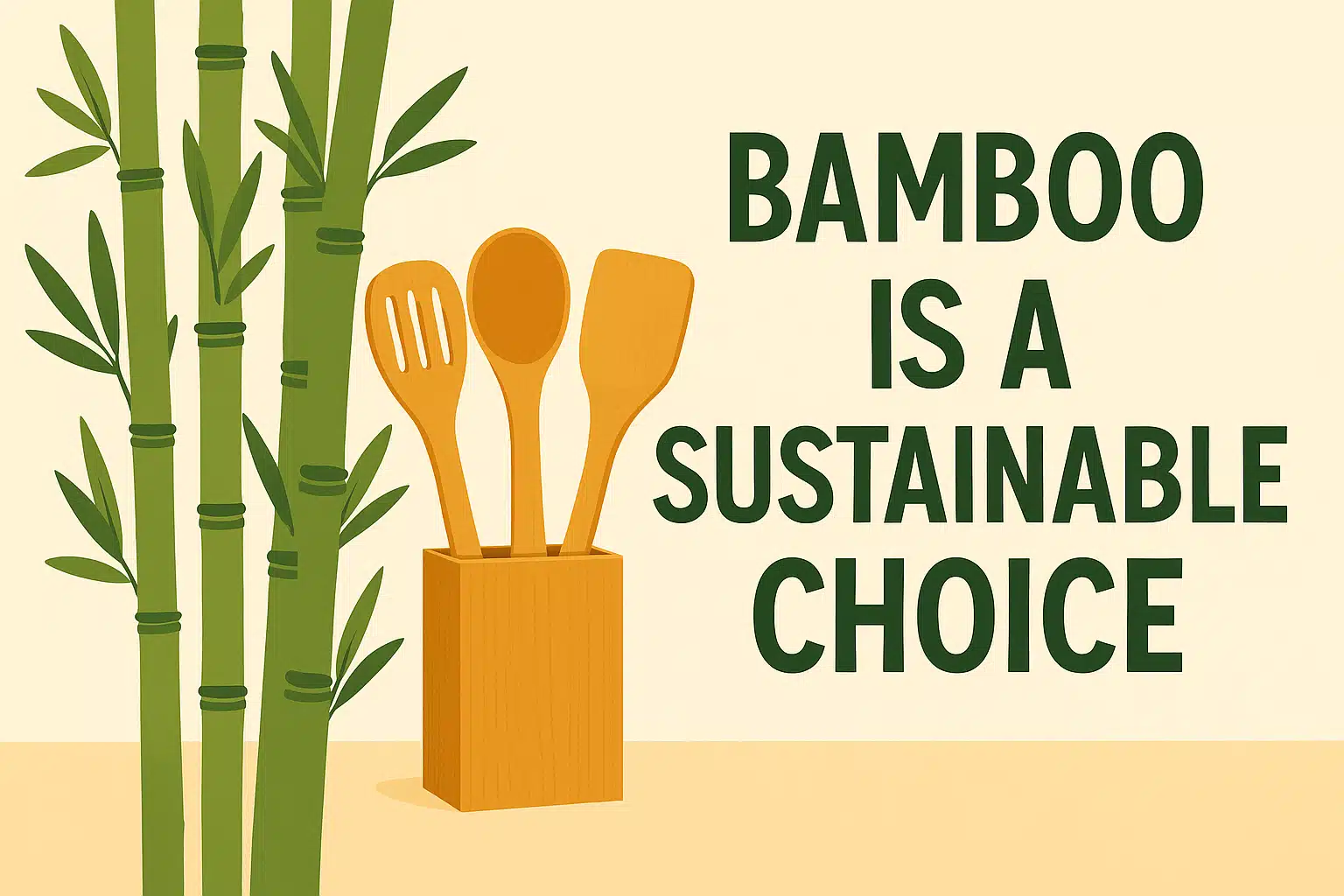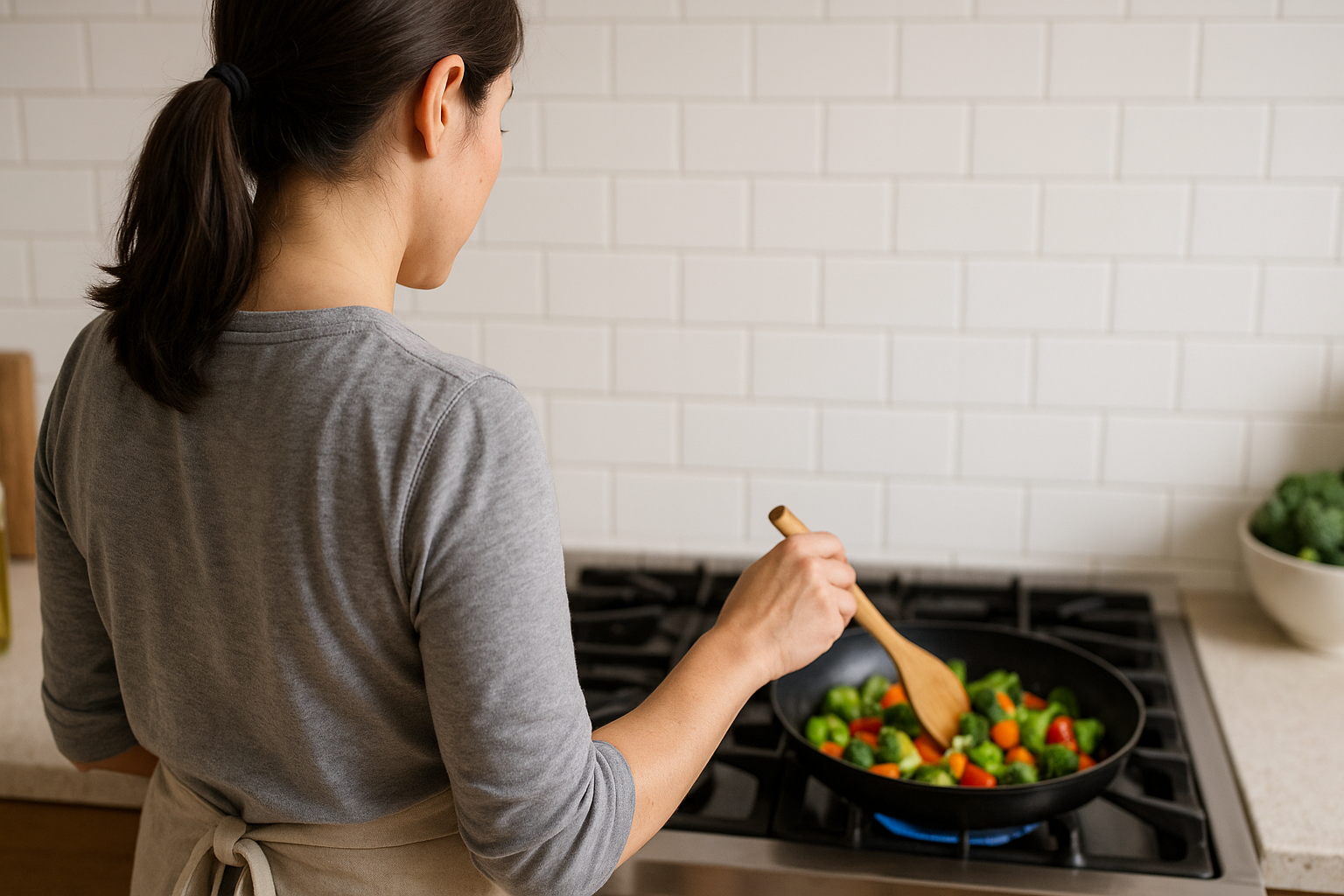Bamboo utensils are popping up in more kitchens—and for good reason. They’re light, comfortable to use, and won’t scratch your nonstick pans. Unlike plastic, they don’t leach chemicals, and they come from a fast-growing, low-impact plant.
Here’s what it’s really like to cook with bamboo utensils—from the upsides to the small stuff you’ll want to watch out for.
Table of Contents
Why Bamboo Utensils Work So Well for Everyday Cooking
There’s a reason bamboo utensils are showing up in more home kitchens. They’re simple, sturdy, and just make sense. Here’s what people like about these bamboo cooking utensils:
- No scratching your pans – Bamboo is gentle on nonstick and ceramic coatings.
- Light in your hand – Great for long cooking sessions or folks with wrist pain.
- No weird smells – Bamboo naturally fights off bacteria and mold.
- They don’t get hot – Unlike metal, bamboo stays cool even near high heat.
- Tougher than they look – Strong enough to handle daily meals.
- Kind to the planet – Grows fast, doesn’t need pesticides, and breaks down naturally.
Are Bamboo Utensils Safe for Cooking?
Yes, as long as you stick to solid bamboo—nothing glued or made with resin. Good-quality bamboo utensils won’t melt, leach chemicals, or react with acidic foods. They’re a safer choice than plastic and a gentler one than metal.
Just make sure to check that there’s no glossy coating or synthetic finish. The plainer the better when it comes to food contact.
How Long Can You Expect Bamboo Utensils to Last?
If you care for them properly, bamboo utensils can last several years, often 2 to 10, depending on how hard you use them. What shortens their life? Dishwashers, soaking, and storing them wet.
🧼 Bamboo Utensil Care Checklist
- ✔ Hand wash only—never use a dishwasher
- ✔ Don’t leave them soaking
- ✔ Dry them right away
- ✔ Don’t leave them sitting in hot pots or pans
- ✔ Use a ventilated drying rack or upright container to store
- ✔ Rub in food-safe oil now and then
- ✔ Store in a dry spot
Once they splinter, crack, or absorb smells that won’t go away, it’s time to replace them.
How to Oil Bamboo Utensils and Why It Matters
Oiling isn’t just for looks—it helps prevent your bamboo cooking utensils from drying out, cracking, or absorbing food smells. Use a food-safe oil like coconut, mineral, or fractionated olive oil.
Here’s how:
- Rub a small amount of oil on a clean, dry utensil with a cloth
- Let it soak in for a few hours or overnight
- Wipe off any excess
Once a month is usually enough, or more often if your tools start looking dry.
Bamboo vs Metal, Plastic, and Wood: How It Stacks Up
Here’s a quick side-by-side to help you see how bamboo compares:
| Feature | Bamboo | Metal | Plastic | Wood (e.g., Teak) |
|---|---|---|---|---|
| Eco-friendly | Yes | No | No | Varies |
| Biodegradable | Yes | No | No | Yes |
| Heat Resistance | High | High (but conducts) | Low | Moderate |
| Nonstick Safe | Yes | No | Yes | Yes |
| Durability | High | High | Moderate | High |
| Lightweight | Yes | Varies | Yes | Moderate |
| Odor/Stain Resistant | Yes | Yes | No | No |
| Maintenance | Easy (hand wash) | Easy (dishwasher) | Easy (dishwasher) | Moderate (hand wash) |
Bamboo vs Silicone: A Quick Comparison
Bamboo and silicone are both good alternatives to plastic, but they serve different purposes. Bamboo cooking utensils are great for serving, stirring, and low to medium-heat cooking. Silicone excels in high-heat use and scraping batter from bowls.
If you bake often or need flexibility, silicone might make sense. If you want natural materials with a minimal footprint, bamboo is your go-to.
Buying Bamboo Utensils?
Here’s What to Check
- Solid bamboo (not pressed or laminated)
- No lacquer or chemical finish
- Rounded, smooth edges
- Natural, untreated bamboo with no added finishes or chemicals
- Made for kitchen use—not decorative
Are There Any Drawbacks to Using Bamboo Utensils?
A few. Here’s what to keep in mind:
- Dishwashers are a no-go – They can cause cracking and splintering. Prolonged heat and moisture weaken the bamboo fibers.
- Odors may stick – Especially with strong spices or sauces if not washed promptly.
- Watch for hidden glues – Cheap ones might use resin or adhesives.
- Not for tough scraping – Bamboo can crack or splinter under pressure—it’s not the best choice for scraping burnt food or stirring dense doughs.
Most of these are easy to manage if you know what to expect and take care of your tools.
When Bamboo Utensils Might Not Be the Right Fit
Bamboo works well in most kitchens, but it’s not the best choice for every task. If you often scrape fond off the bottom of cast iron, stir heavy doughs, or use high-heat grilling tools, you may want a sturdier material. Bamboo can splinter under extreme pressure or heat, and it won’t replace your go-to metal spatula for serious searing.
Metal utensils outlast bamboo when it comes to pure durability. They handle extreme heat, won’t splinter, and can take more pressure. But metal can scratch nonstick surfaces and leach into acidic foods—two things bamboo doesn’t do. So while bamboo won’t replace your heavy-duty spatula, it wins on versatility and safety for everyday tasks.

What Makes Bamboo a More Sustainable Option?
Bamboo grows like crazy—it can shoot up several feet in a day, doesn’t need replanting, and thrives without much water or any pesticides. According to GreenPacks, some species can grow up to 91 centimeters (about 35 inches) in just one day, making bamboo one of the fastest-growing and most renewable plants in the world.
When your bamboo utensils wear out, they won’t sit in a landfill for a century like plastic. They’ll compost naturally under the right conditions.
That said, not all bamboo cooking utensils are compost-friendly. If they’ve been treated with glue or lacquer, they won’t break down as easily. And even if they’re natural, many curbside compost programs don’t accept them, so check your local guidelines first.
It’s a small swap, but one that supports a cleaner kitchen and a lower-waste lifestyle.
Frequently Asked Questions About Bamboo Utensils
- Are bamboo utensils good for you? Yes, as long as they’re made from solid bamboo without glues or coatings, they’re safe and non-toxic.
- How long do bamboo utensils last? Anywhere from 2 to 10 years, depending on care and frequency of use.
- Do bamboo utensils hold bacteria? They resist it naturally, but still need regular washing and drying.
- Is bamboo toxic free? Solid bamboo is—just avoid pressed bamboo with synthetic resins.
- Is it safe to cook with bamboo utensils? Yes. They’re gentle, won’t leach, and don’t react with food.
- Do bamboo utensils get moldy? Only if stored wet. Keep them dry to avoid mold.
- When should I replace my bamboo utensils? When they crack, splinter, or absorb odors that don’t wash out.
- Can you wash and reuse bamboo cutlery? Absolutely—just skip the dishwasher.
- Are bamboo utensils better than plastic? Yes—safer, sturdier, and won’t leach chemicals into your food.
- Can you use bamboo utensils in nonstick pans? Definitely. They’re gentle enough for all types of coatings.
Final Thoughts: Should You Add Bamboo Utensils to Your Kitchen?
If you’re trying to cook with fewer chemicals, avoid scratched pans, or just want a tool that won’t end up in the trash too soon, bamboo utensils are worth a look. These bamboo cooking utensils are simple, practical, and better for the planet than most of what’s out there.
Still curious what set to pick? I’ve reviewed some of the top options—check out my bamboo utensils set review if you want help narrowing it down.

Kristin is the founder of Eco Bamboo Living. She shares honest, research-backed guides and product reviews to help readers find bamboo products that are truly sustainable, practical, and worth bringing into their homes.

